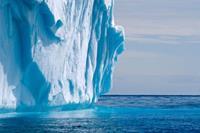Recent polls suggest the public in the UK and US are becoming increasingly sceptical about climate change
Recent polls suggest the public in the UK and US are becoming increasingly sceptical about climate change.
The UK poll, commissioned by BBC News and conducted in early February, shows a marked increase in climate change scepticism compared to just a few months ago, possibly a result of recent press reports alleging scientists manipulated research data to strengthen the case for global warming.
The survey of 1001 adults indicated that 25 per cent of people do not believe that ’the Earth’s climate is changing and global warming taking place,’ compared with only 15 per cent of adults in November.

A major shift was also seen in the number of people who agreed that ’climate change is happening and is now established as largely man-made’ - dropping from 41 per cent in November to 26 per cent by February.
A similar swing has been seen in the US. Shortly before the scandal involving hacked emails at the University of East Anglia’s Climatic Research Unit (CRU) which suggested that scientists may have manipulated data to favour the case for man-made climate change, a report from the Pew Research Center in the US revealed a significant drop in the number of Americans who believed there was firm evidence of global warming.
In October 2009, just 57 per cent of the 1500 people surveyed believed there was solid evidence that the Earth’s average temperature has been increasing over recent decades, down from 71 per cent in April 2008. Fewer people also saw global warming as a very serious problem - just 35 per cent in 2009 compared with 44 per cent in 2008.
Mike Pilling, an atmospheric chemist at the University of Leeds, UK, described the increased scepticism as a ’very great cause of concern.’ Keeping global warming within acceptable limits will require ’substantial change in behaviour - both in the way we live our personal lives and the ways in which we influence politicians,’ he says. ’This dramatic shift in opinion shows we seem to be moving in the wrong direction.’
Adding to the problem, the UK poll comes following not only the CRU email controversy, but also news in January that the Intergovernmental Panel on Climate Change had erred by asserting Himalayan glaciers might melt away by 2035.
’At face value, it does seem that these two occurrences, and the attitude of much of the press in reporting them, have led to the shift in opinion,’ say Pilling. ’Unfortunately people don’t read the details but only see the headlines.’
That said, Pilling says researchers nonetheless have an important role to play in the debate. ’I think that scientists have to be more open about their methods and their data,’ he says. ’There is nothing new in that - it is how the best science operates. Once a scientist has published a paper, the data on which that paper is based should be open to scrutiny.’
Ned Stafford






No comments yet